People often garner praise and recognition for their devotion to selflessly serving and protecting others, but that recognition quickly transforms into intense speculation and question when they unexpectedly decide to defend their perceived enemy. That public curiosity becomes even more heightened when that protection is provided during a time of heightened conflict. That’s certainly the case amongst the main characters in director Steven Spielberg’s upcoming historical drama, ‘Bridge of Spies.’ The biographical film’s helmer recently participated in a press conference with cast members Tom Hanks, Alan Alda, Amy Ryan and Mark Rylance at New York City’s Ritz Carlton-Central Park Hotel, and promoted the significance of why warring nations should treat prisoners of war with respect, as well as the bravery of the people who protect their supposed enemy.
‘Bridge of Spies’ was written by Matt Charman and Ethan and Joel Coen, is set to be distributed into domestic theaters by Walt Disney Studios Motion Pictures this Friday, October 16. The story follows James B. Donovan (Hanks), a principled insurance attorney who’s unexpectedly chosen by his partners at his law firm, including Thomas Watters Jr. (Alda), to represent a high-level Soviet spy, Rudolf Abel (Rylance), who was caught in New York. The devoted husband to Mary (Ryan) and dedicated father to their two daughters and son also has a professional dedication to his client and an abiding loyalty to the principles of the U.S. Constitution.
After Abel, a British-born Soviet spy, is captured in 1957, Donovan has no chance of winning the case. But he successfully presents a strong argument for not giving his client the death penalty, as Able has the potential to be used in a high-value swap for an American spy in the future. That chance comes with American jet pilot Gary Powers (Austin Stowell), who’s trained with to fly in the U-2 spy plane program for the CIA. Powers and his team must take highly detailed photographs of military installations within the Soviet Union as they fly slow lightweight jets at 70,000 feet. He soon becomes the most high-profile American prisoner in the Soviet Union when his plane is shot down.
Upon hearing the news of Powers’ capture by the Soviets, Donovan sees his chance to finally send his client, who’s serving a 30-year sentence in America, home, in exchange for Powers, who also receives a lengthy prison punishment. After the American lawyer agrees to act as an unofficial representative for his country and travel to Berlin to set up the trade of the two prisoners, he learns that an American student, Frederic Pryor (Will Rogers), who has been arrested in Germany. Prisoned for trying to get his East Berlin girlfriend into West Berlin before construction on the Berlin Wall is completed, Donovan insists both Pryor and Powers be sent back home to the U.S. if the Soviets want Abel back. With the help of an East German lawyer, Wolfgang Vogel (Sebastian Koch), who’s acting on the Soviet spy’s behalf, Donovan takes whatever measures are necessary to secure the exchange.
Spielberg started the press conference by admitting that he hadn’t known much about Donovan’s life and career before he signed on to helm ‘Bridge of Spies’ two years ago. But “I did know about Gary Powers, because (his story) was big national news when he was shot down, and taken prisoner in the Soviet Union,” the director further revealed. However, the filmmaker didn’t know how the American pilot was brought home after being found guilty.
But when Spielberg did learn all the details about the Cold War case, he felt compelled to sign on to helm the drama, as he felt it was a piece of history that was compelling. He was drawn to the fact “that a man stood on his principles, and defied everyone, including his family, for what he thought he needed to do.” The filmmaker pointed out that Donovan stood by the idea of “equal protection under the law in this country, even for an alien in this country, even for a Soviet accused spy.” He felt the lawyer’s belief was “a righteous reason to tell the story.”
Since Spielberg was instantly intrigued to tell Donovan and Abel’s story when he first heard about it, he admitted was stunned when he found out from the lawyer’s children on the morning of the press conference that he wasn’t the first person in Hollywood to try to adapt the story for the screen. “In 1965, Gregory Peck came after this story. (He) got Alec Guinness to agree to play Abel. Peck was going to play Donovan, and they got Sterling Silliphant to try to write the script. Then, MGM at the time said, “No, I don’t think we’re going to tell the story.”
Alda then asked his director if he knew why the film production and distribution company didn’t want to tell the story, particularly if it was still politically difficult to discuss in the mid-1960s. Spielberg replied that “the Bay of Pigs had just happened. The Cuban Missile Crisis had been averted a year-and-a-half before, and the tensions were too taut between the Soviet Union and the United States of America for MGM to get into the politics of the story.”
Since he spoke to Donovan’s children about their father’s involvement in the spy case, Spielberg was also questioned if he was able to speak to Abel’s family. “No, not at all. Abel went into the obscurity behind the Iron Curtain,” the helmer revealed. “At one point toward the end of Donovan’s life, he went to Russia with the hope of meeting Abel again, and wasn’t able to find him and get into contact with him…He was hoping to have one more moment with him, but never had that moment.
Hanks was also asked if his character, who’s shown to be an unsung real life American hero in the historical drama, is a bookend, or another chapter, to the other courageous man he has played throughout his career. The two-time Academy Award-winning actor revealed that “I don’t view this as a bookend to anything, because every movie starts fresh and has to exist on its on auspices. The interesting thing that happens when you play somebody real is you have to have meetings with them if they’re alive. You have to say, ‘Look, I’m going to say things you never said. I’m going to do things you never did. I’m going to be in places you never were.’ Despite that, how do we do this as authentically as possible?”
‘Bridges of Spies’ lead actor then admitted that like Spielberg, “I was fueled by absolutely no preconceived knowledge of James Donovan.” Hanks also endearingly admitted that “When you’re coming across the guy who is a good insurance lawyer, but then ends up being part of such a momentous six days in history, (I’ll be) a selfish actor. I’ll lunge at the opportunity, regardless of anything else I’ve done prior.”
Continuing the discussion on representing heroes in their films, Spielberg disclosed his experiences of making movies about both fictional and real protagonists. “I don’t really distinguish between a fictional hero and a real life hero as a basis for any comparison. To me, a hero’s a hero. I like making pictures about people who have a personal mission in life, or at least in the story.” The helmer added that he’s drawn to chronicling characters “who start out with certain low expectations, and then overachieve our highest expectations for them.”
Hanks then chronicled his process of relating to his heroic protagonist in ‘Bridge of Spies,’ including how he referenced Donovan’s first book, ‘Strangers on a Bridge, The Case of Colonel Abel,’ which was published in 1964. The actor appreciated how in depth the lawyer wrote about his experience with Abel, particularly during his client’s trial.
The actor also mentioned what he felt the heart of his character in the drama was in part linked to him being a prosecutor in the trials of the Nuremberg war crimes. But Hanks emphasized “That means he wasn’t the type of soldier that went off and wanted to kill as many Nazis as possible. He was a guy who wanted to nail as many Nazis as possible using the letter of the law…When you take that into account, it pays off in the screenplay.”
The filmmaker then commented on the lessons Donovan and the case would have for the population today, as well as the impact they hope the movie has on the national conversation. Spielberg noted that “the national conversation…keeps changing every day. You can’t make the national conversation your priority.” But he noted that he feels “You make a movie that is relevant to our times because the Cold War seems to be coming back. I wouldn’t call what’s happening right now between Vladimir Putin and the Obama Administration a Cold War, but there’s certainly a frost in the air.”
Spielberg added that “With the recent incursion into Crimea and ambitions further into Ukraine and what’s happening right now in Syria, it seems like history is repeating itself.” While those political situations hadn’t occurred yet when he began making ‘Bridge of Spies,’ he feels “there is so much relevance between the story in 1960 and the story today.”
While the director recognizes the growing international tensions that are currently happening, he also appreciated the visual aesthetics of the historical drama. When asked about the process of shooting the film’s scenes that are set in East Berlin, especially as the train goes over while they’re building the Berlin Wall, he revealed that “We shot that on border of Poland and Germany in a town called Breslau. There’s a Polish name for it, but when the Germans invaded Poland, they changed the name to Wroclaw.
Spielberg also harrowingly noted that “There’s still bullet holes World War II in all the buildings from there; they never repaired it. We went to the area closest to the east of Berlin that looked just like East Berlin” for the train sequences. “We actually built that wall. (We had) a wonderful production designer, Adam Stockhausen, who does all of Wes Anderson’s movies. He did ‘12 Years a Slave,’ and won his first Oscar for that. He did an incredible, exceptional job making a modern scenic look exactly the way it looked all those years ago.”
Rylance then chimed into the conversation by noting how he became involved in playing the Russian spy in the drama. He explained that he received “a message that Steven was interested in me playing this part. We had met each other back in the ‘80s.” While the actor hadn’t been able to star in Spielberg’s 1987 war film, ‘Empire of the Sun,’ after they initially met, he revealed that he “was very delighted that he came to me again and asked me to take part in this and I could work with these people.
The cast then explained why they felt it was important to enhance the story of the lawyer and spy’s negotiation and trial with also showing Donovan’s work and home lives. “I think what’s so fascinating is that this is a happily married couple who are both devoted to their family,” Ryan stated. “I love that Mary is so outspoken and protective of that. Yet, she knows (her husband’s) also involved in some other greater good, (but) she’s not quite sure (what that good is).” The Oscar-nominated actress added “here’s a man who’s loving his family, and (is) still setting forth for the greater good. (He) can push apart fear that the majority of the country is feeling at this time.”
Alda echoed his co-star’s sentiment, saying “I loved how they were able to develop the home life so believably, like two people who were running a family together. That gave resonance, I thought, to the moment where I said to him, ‘Don’t do this. Think about your family. Think about what it’s going to cost them.’ That really would have been a hollow argument if you hadn’t experienced their home life in such an authentic way.”
The Emmy Award-winning actor added that he also thinks the Donovan family dynamic is important to the entire theme of the movie, “so you can understand what these people were going through. (Viewers can also understand) what they were thinking when they did and said things that were not in the interest of justice, but other considerations…that brought you back to the real drama of the situation at that time.”
Alda further explained that the fact that Donovan and Watters were not only partners, but also had a father-son type of relationship, really pushed his character to feel protective over his colleague. “That probably added some of the tension and disappointment in the movie as it progresses, because those were days when you often worked for a company until you retired, sometimes from the time you started your career,” the actor noted.
“When Watters decides that the business he’s in is more important than the relationship with this guy who’s one of his partners, that’s a significant moment,” Alda also said. “It’s very interesting that serving his clients and keeping the company free of public debate was more important than justice, and he had the same training in law that Donovan did. That really puts so much more attention on Donovan’s commitment to justice.”
Further speaking on the telling and presentation of the film’s story, Spielberg revealed that ‘Bridges of Spies’ has a very distinct Coen brothers’ flair. Since “they’re not here to speak for themselves, I’m just going to hazard a guess that this was a genre they were very compelled by as lovers of movies and genres like the spy genre,” the three-time Oscar-winning filmmaker said. “I know that they reached out to us because they heard about the story…I think when they reached out to us they thought that we just had a treatment, and didn’t even have a script yet. So they were wondering if I wanted to meet with them,” the director admitted.
“I let them know that we did have a wonderful script by Matt Charman, but I was going to go deeper with all the characters, the story and the research, so they…stepped on board because this was a genre that really peaked their interest,” Spielberg continued. “We’re very lucky to have them…They made a huge contribution while always acknowledging the heavy lifting that Matt did when he first found the story. They put it altogether in a manageable, very taut drama.”
Rylance then divulged that he “took the job on the first script, which, as Steven says, is wonderful. It was absolutely fascinating to then see what the Coen brothers’ imagination did to a script,” the Emmy Award-nominated actor noted. “It wasn’t a different story than what Matt had created. It was Matt’s body, but (the Coens) had just really (helped make it come) even more alive.”
Hanks then noted that ‘Bridge of Spies’ is the second time he had collaborated with the Coens, after he starred in the 2004 black comedy thriller, ‘The Ladykillers,’ which the filmmakers wrote, directed, produced and edited. He praised their overall work and careers because “Their dialogue scans…ends up devolving into a percuss of give and take that’s different than other motion picture dialogue, in which that it’s mostly text as opposed to subtext. There’s a number of great examples of it throughout (the drama).”
The actor added that “a lot of times you read in the screenplays (that) one very specific thing is happening in the scene and both characters sound the same after a while. They just lock into the antagonist, protagonist thing, and that just never happens with this (movie). It seems as though somebody is either rocking back on their heels in a Coen brothers’ scene, while another person is making arguments that you can’t even begin to imagine.”
Hanks then praised the way the right to counsel and the right to issue defense is showcased in the film. “Immediately after I read the screenplay, I did what everybody does; you just Google the guy you’re going to play. You just Google James Donovan, and there was an awful lot. A lot of it was repetitious, but I came across a piece on YouTube in which the real Donovan was interviewed at the courthouse as he was defending Abel. He literally stated the reason why he took the case and the reason why he carried it all the way to the extremes of the Supreme Court.”
The film’s lead performer then noted how his character’s real-life counter-part said, “‘You can’t accuse this man of treason. He’s not a traitor. He’s actually a patriot to his cause. Only an American be a traitor. Only American can commit treason against their own country. He’s just a man doing his job in the same way we have men doing their jobs over here.’”
Hanks added that he felt it was right that Donovan so determinedly stood up to protect his client. The actor passionately agreed with the lawyer’s philosophy that “As soon as you start torturing the people that we have, then you give the other side permission and cause to do the same exact thing. That’s not what America stands for, at least not what the Americans stand for at the time when I took ethics in school. As soon as you start executing anybody against your country, you’re not that far removed from the KGB and the Stasi. This is what Donovan took with him from the get-go.”
Check out Shockya’s exclusive photos from the New York City ‘Bridge of Spies’ conference below.
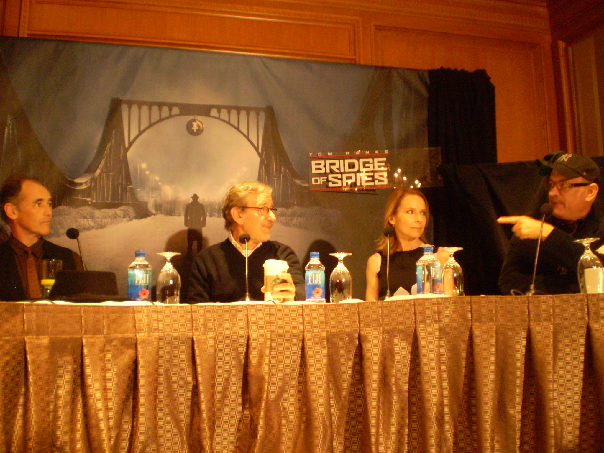
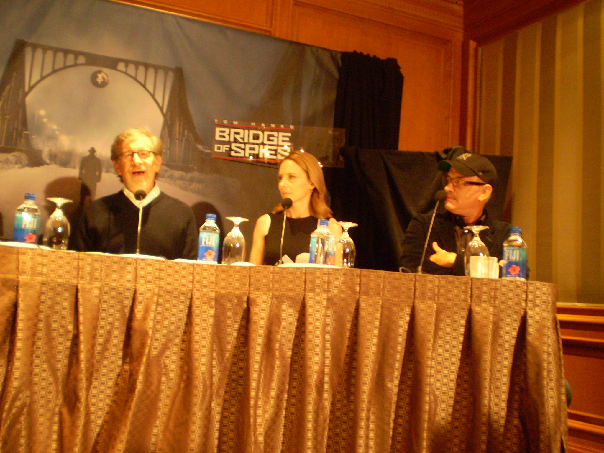
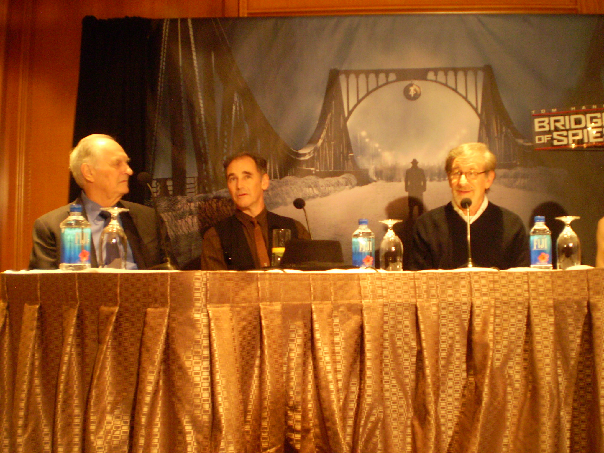
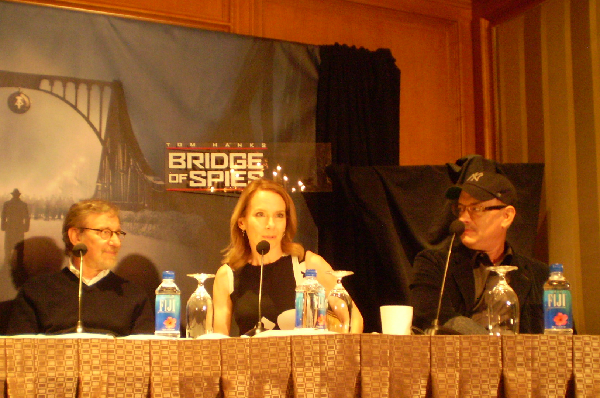
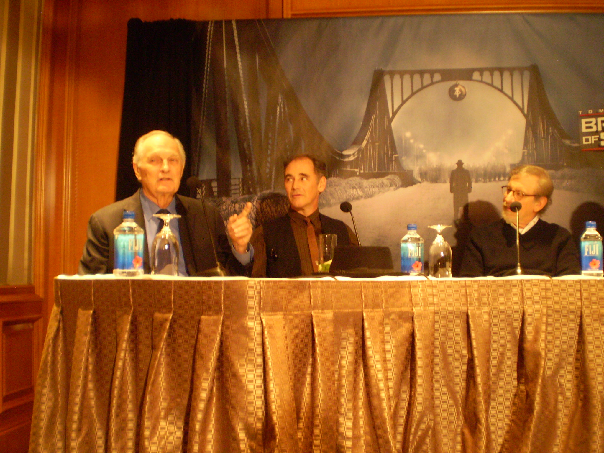
Written by: Karen Benardello
